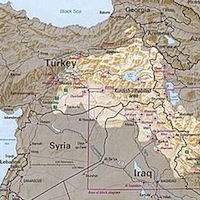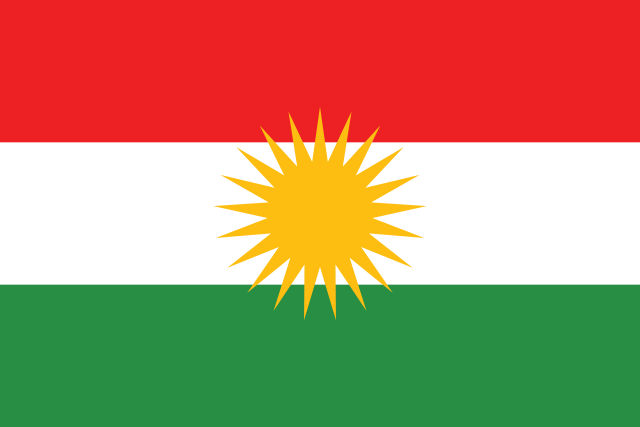ISIS — now known as “Islamic State” following its recent declaration of establishment — just won a significant operation against what is arguably Iraq’s most effective fighting force, the Kurdish Peshmerga paramilitaries. So, everything is probably really about to go sideways now.
The immediate loss of two more towns is another destabilizing and demoralizing blow:
The Islamic State captured the northern towns of Sinjar and Zumar on Saturday, prompting an estimated 40,000 from the minority Yazidi sect to flee, said Jawhar Ali Begg, a spokesman for the community.
[…]
“Their towns are now controlled by [Islamic State] and their shrine has been blown up,” Begg told The Associated Press. The group gave the Yazidis, who follow an ancient religion with links to Zoroastrianism, an ultimatum to convert to Islam, pay a tax or face death, Begg added.
But perhaps worse, through this operation, ISIS captured another northern oil field (number 5 in Iraq, not to mention their Syrian oil and gas fields), as well as the largest dam in all of Iraq, the massive hydroelectric Mosul Dam on the Tigris River. With every flare-up in violence or war since the 1986, there have been persistent fears that someone will intentionally blow it up to cause torrential and lethal downstream flooding in many major Iraqi cities.
The Kurdish troops, who retreated in the face of the ISIS advance after some fighting, assert that they were hung out to dry — not even getting sufficient ammunition assistance — by the central government of Iraq, which has been simultaneously blasting their separatist tendencies and explicitly relying upon them to “hold the line” against ISIS while they figure out what the do. The Kurds have been responsible for protecting thousands of refugees fleeing the city of Mosul, the center of ISIS operations in Iraq.
The Iraqi central government now says they will provide support from their air force, but will still rely upon the Kurdish regional forces to do the heavy lifting on the ground. I seriously question whether Iraq will come through with the promised air force, both on efficacy grounds (lack of training and recent acquisition of planes not previously used there) and because Iraq Central (i.e. Maliki) has probably convinced itself (rightly or wrongly) that credibly arming and seriously helping Kurdistan is the bigger long-term threat to a unified Iraq than ISIS. The Maliki camp in Baghdad also seems more interested in specifically helping the paramilitary of their Kurdish allies in the Regional Opposition, rather than assisting the ruling party’s paramilitary or all the factions of Iraqi Kurdistan. So don’t count on Baghdad to step up now in any meaningful way.
However, I’d now consider it within the realm of possibility — inconceivable three months ago — that we might be about to watch Turkey start arming a Kurdish paramilitary for the first time ever, despite nearly a century of antipathy. The increasingly “acceptable-to-Turkey” ruling Kurdish Democratic Party (KDP) in Iraqi Kurdistan is essentially only truly valuable to Turkey as long as it remains an effective buffer against Iraqi chaos. And right now, without weapons from Baghdad, despite extensive demands being placed upon it, it can’t do that. I think Turkey’s government can plausibly (and perhaps quite accurately) suggest that arming/supplying the KDP (if not any of the other Kurdish factions in the area) is essentially not a credible blowback risk to Turkey whatsoever, while the consequences of not doing so are incalculable.
The bigger hiccup would probably be that, despite Turkey’s ruling AK Party making increasingly bold allusions to an alleged alliance with the KDP — see our full background report here — this would not be a move with popular support (or perhaps more fairly, there would be a vast political backlash from opponents whether they’re a majority or not), so it would probably require covert assistance. Erdogan in particular seems to have launched his bid for the presidency, in which he already (incredibly) managed to secure the support of the PKK, the longtime Kurdish separatist party in Turkey. And who knows how much more political margin he has for being seen as openly aiding and collaborating with Kurds.
 I also suspect that reports that Syrian Kurdish rebels have crossed into Iraq to participate directly in Iraqi Kurdish operations may stoke further Turkish fears of a re-emerging transnational Kurdish unification movement, even after lots of pressuring Iraq’s KDP to be “good Kurds” who don’t work with “bad Kurds” from neighboring countries, including Turkey.
I also suspect that reports that Syrian Kurdish rebels have crossed into Iraq to participate directly in Iraqi Kurdish operations may stoke further Turkish fears of a re-emerging transnational Kurdish unification movement, even after lots of pressuring Iraq’s KDP to be “good Kurds” who don’t work with “bad Kurds” from neighboring countries, including Turkey.
But at the end of it all, it will mostly come down to whether Turkey feels less safe from a vague and easily reversible sense of growing Kurdish camaraderie or from a total collapse of the Iraqi north and solidification of the so-called “Islamic State.” Quietly sending weapons to the KDP in Iraqi Kurdistan is probably the far less bad option when set against visions of millions more refugees flooding into Turkey, chased by murderous and evidently well-trained ISIS insurgents.
The Iraqi Kurds have also frantically appealed to their longtime American allies for weapons and assistance, and that seems the likeliest source to come through.
Meanwhile, on the other side of the ISIS zone of control, in Syria, regime forces there battled ISIS troops a couple weeks ago in a highly populated area. After two days of fighting, the total death count was at least 700, making it the bloodiest point in the 3+ year old Syrian civil war.
 Above: The Flag of the Kurdish Regional Government of Iraq.
Above: The Flag of the Kurdish Regional Government of Iraq.


